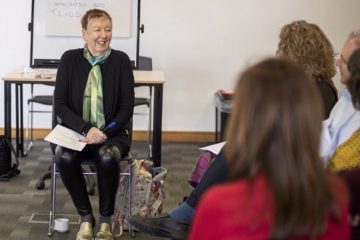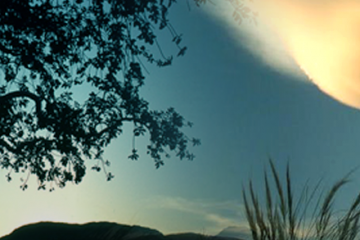The evolution of coaching – where is the leading edge of coaching today?
The modern coaching profession as we know it today has evolved through a complex interplay of origins, including sports coaching, various psychologies and the human helping professions – in response to an ever changing panoply of individual and organisation needs. The profession has grown with a richness in diversity such that coaching can mean many different things to different people, so it is important to say what we mean when we refer to coaching. Specialisations abound with developments being drawn from related fields including somatic and trauma work, constellations and systemic working, developmental theory, the mindfulness and resilience fields. New approaches and hybrid modalities are emerging alongside classical distinctions such as life coaching and executive coaching. Where does all this stand in the light of the seismic shifts that are taking place in society and our collective consciousness? Are there patterns or trends to be aware of, particularly if you are a coach making choices about which training and development to undertake next or how to position yourself in the overcrowded coaching marketplace?
In this article I offer my take on these patterns and start making the case for an holistic approach to leadership coaching. In my next article I will address some of the critical issues facing both coaches and the profession as a whole, including the need for self-regulation and shared standards, the over-supply of external coaches and the growth of internal coaching, professional isolation and partnering models, the relationship of coaching with therapy and trauma work. I have touched upon some of these themes in my book on psychosynthesis leadership coaching (Howard, 2020) but I sense that the events of the last couple of years are making an update necessary and in this article I draw upon my recent experience of working with dozens of leading edge coaches on our training courses and in supervision.
There are horizontal and vertical developmental trends to be aware of which I will outline briefly. I will then explore these in relation to the extraordinary shifts we are witnessing in societal consciousness today.
Horizontal developments in the coaching profession
The traditional primary distinction within modern coaching has been between life coaching on one hand and executive, business, leadership or organisational coaching on the other. The context of whether a coach’s contractual relationship is with an individual or an organisation is central to shaping the nature of the work that takes place, and most coaches gravitate towards one or the other type of work. However, the lines are becoming blurred, as we see coaches working with professionals and leaders, entrepreneurs and solopreneurs, artists and creatives, healers and health workers, educators and thought leaders, just to give some examples, where life and work come together within the context of personal and professional development, where purpose, meaning and values are explored alongside outer goals of all descriptions. Within this context, the interplay of inner and outer life is a key part of how we work within a psycho-spiritual awareness of the whole person and the being of the coachee.
We call what we do leadership coaching, which I find transcends the limiting labels of both life and executive coaching. It is important to define what we mean by leadership in this context – it is not so much a formal role taken by people within organisations as a calling or an orientation to our lives and work. Our model of leadership shows a nested relationship between leading self, leading others and leading systems. The starting point (for both the coach on their journey as well as the coachee on theirs) is always leading selfwith the focus on self-awareness and the inner relationship with ourselves that this involves. From here we can consciously explore how we come into relationship with others through attention to unconscious psychological dynamics reflecting mirrors of the past, through attunement to our intended and unintended impact, through awareness of how people are different and through inclusion of diversity. Our focus for leadership development therefore follows this sequence of self-awareness, other-awareness, systemic-awareness – to which we would add developing the capacity for free will and an openness to help (following 5DL or the Five Dimensions of Leadership: Roger Evans, 2020).
Not everyone we coach is formally leading others or leading systems (whether families, communities, groups, teams, organisations, networks, projects, etc), but everyone has the potential to lead themselves in relationship to their calling, purpose or emergent meaning. In this sense leadership becomes a democratic principle that can animate the lives of all our coachees whatever the contextual setting.
This growing conception of leadership coaching goes hand in hand with an evolution of consciousness in the coaching space towards developmental and holistic coaching, which I explore below.
Vertical development in coaching – worldviews or paradigm shifts
The evolution of coaching has very broadly, and not always in an entirely linear way, followed this progression:
- Behavioural change coaching
- Performance coaching
- Developmental coaching
- Holistic coaching
In its early days, organisational coaching was often seen as a remedial activity, proscribed by someone’s manager to correct negative behaviour patterns or develop key skills that were missing. The emphasis gradually shifted to improving performance and delivering results through a focus on goals and outcomes which aligned individual progress and success with organisational objectives. This became the dominant paradigm, at least within organisation coaching, as epitomised by Sir John Whitmore’s seminal work Coaching for Performance (Five Editions 1992-2017).
Alongside performance coaching, over the last 20 years or more, developmental coaching has gradually become more widespread and the more enlightened people-oriented organisations usually set this as the context for coaching. The key shift in focus this involves is towards coaching the person rather than simply coaching for desired outcomes, although this will involve setting personal or leadership development goals as part of the longer-term coaching perspective. Developmental coaching draws more explicitly upon psychological approaches and tools such as personality profiling as well as the wider topic of horizontal and vertical leadership development.
The three coaching paradigms briefly described above – Behavioural, Performance and Developmental – approximately correspond to three stages of development or worldviews as described in any developmental model, for example Conformist, Achievement and Pluralistic within Frederic Laloux’s organisational paradigms (see Howard, 2020 Chapter 13 for a full overview). By implication, there needs to be an awakening of the pluralistic worldview (within a coachee and the organisation) that embraces the value of personal development for developmental coaching to be possible. Until then, coaching might be primarily focused on concrete goals that represent material or outer achievement and success for the coachee. A psychological perspective can be seen as useful to the extent to which it enables results or improvement, but not for the value of insight into self in its own right. However, breakdown or existential crisis can often be an outcome along the achievement or self-actualisation path for leaders, as John Whitmore describes in the later chapters of Coaching for Performance (Whitmore, 2009):
I will not go into more detail here about the techniques and potential pitfalls of coaching people through a major crisis of meaning once it happens. It can be a profound experience and an unsettling time for people who have travelled a long way along the horizontal plane before it occurs. I strongly advocate some training in psychosynthesis or a similar psychology for independent coaches who wish to enter this field or may unexpectedly find themselves there.
He goes on the address the needs of coach development for those wanting to work beyond the performance or achievement paradigm:
Certainly to be most effective coaches do need to go beyond the basic skill level of asking questions to raise awareness and responsibility, listening well, running the coachee’s agenda and following the GROW sequence. There is much more to coaching than that and this takes us into the next evolution of psychology… Psychosynthesis offers a number of maps and models, the strands of which weave a very useful cradle for in-depth coaching.
As we follow the evolutionary path of coaching Whitmore describes, a shift in emphasis for coach training and development takes place, from simply developing skills, understanding process, learning techniques and models – to developing psychological mindedness and psycho-spiritual awareness. This necessarily engages the coach’s personal development as well as the professional – in other words, our continuing personal development journey becomes a key driver for increasing our professional capacity. As the outer world becomes more complex, challenging and stressful, the coach seeks to help their coachees navigate their inner relationship with this, taking us into the realm of what I call holistic coaching. This mirrors the seismic shift in consciousness towards what Laloux terms as Evolutionary or Teal consciousness, or Graves describes as ‘second tier value systems’ (and labels as GT/systemic and HU/holistic), or The Leadership Development Framework (Torbert and Rooke) calls the Strategist and Alchemist stages of development.
What do we mean by holistic in this context? Taking a holistic view of the person means including all of who we are, e.g. body, feelings, mind and spirit and being, or in psychospiritual terms, including the Self and all levels of consciousness – prepersonal, personal and transpersonal, as reflected in our past, present and future. An holistic approach to coaching implies including inner and outer perspectives and domains at individual and collective levels (i.e. what Ken Wilber describes as integral).
And what do we mean by holistic coaching? As with developmental coaching, the holistic coach sees the person rather than the problem and is seeking to work at the level of the being. Becoming a holistic coach means setting out on a path to deepening and broadening our capacity to see the being and engage at the level of Self and Will, alongside working with the here and now of what the coachee bring to the coaching space.
To work in this way requires a foundation in a psychospiritual psychology such as Psychosynthesis (as Whitmore proposes) which offers not just an integrative map of this inner territory but an unfolding and deepening path to working systemically and synthetically with the whole person. Psychosynthesis is an integrative and holistic psychospiritual psychology which is living and growing in response to the emergent challenges and crises we are experiencing at individual, organisational and societal levels today.
It is important to add that holistic coaching transcends but includes all the previous coaching paradigms – so the holistic coach, rather than necessarily following a set method, can also draw upon ways of working from any of the previous paradigms – behavioural, performance or developmental – according to the needs of their coachees.
Shifts in consciousness – the call for holistic coaching
Let us now look at why this holistic approach is becoming so relevant today. The shift that has taken place in many organisations during the global pandemic towards ‘including the whole human being’ is more than superficial or cosmetic, even if it is patchy and inconsistent. It has been mirrored by changing individual expectations and behaviours throughout the workplace, as illustrated by the observed phenomenon of The Great Resignation.
A whole bunch of stuff has been allowed into the workplace and taboo topics have been opened up in the wider societal discourse which cannot easily be put back. It is now OK to talk about mental health issues, or as I would prefer to say, psychological health or well-being. There is increasing recognition of the impact of trauma at different levels in our lives. There is an openness to discussing pressure and expectations in the workplace in relation to the dynamics of power and authority. Reference to the spiritual nature of human beings is no longer so off-limits. We can acknowledge the personal experience of stress and crises in our lives and seek to address the need for self-care, resilience and well-being management. The term VUCA (Volatility, Uncertainty, Complexity, Ambiguity) is increasingly being used as shorthand to describe the psychological environment in which we live our lives. The impacts of systemic environmental factors including the ecological and climate emergencies, technology and social media, tribal identity politics and ideological polarisation are beginning to be understood in terms of how collective consciousness engages with our individual anxieties and even psychopathologies.
For many, the pandemic has been a time for deeper questions to come front of mind. What is my life about? Why am I here? Who am I becoming? There is a sense of people awakening to the need for purpose and meaning in their lives whilst no longer wanting to split out work and life into distinct compartments. There is more freedom to speak about our personal experience of stress, fear and anxiety as well as explore our sense of purpose, whether with friends and colleagues, or with counsellors and coaches. It is more OK to ask for help, to acknowledge crises in our lives and not to see this as a source of shame or failure but as an opportunity to grow and change. This is the call for holistic or psychosynthesis coaching. Within the organisational setting, this call is heightened and expanded by the need for leaders to create a context for others and to work with difficult systemic organisational forces; to work simultaneously at the levels of self-care and resilience, personal development and growth, achieving life/career/leadership goals and bringing about transformation or systemic change.
Working as a leadership coach in this way can be complex, challenging and rewarding. This professional choice benefits from specific training, as well as ongoing supervision and CPPD, partnering and communing with other professionals, regardless of our level of experience. PCL offers two training and development pathways that lead to EMCC Coach Accreditation and Academic Qualification if required. These pathways are opportunities to reflect deeply for ourselves as well as to work with coachees as they ask themselves the deeper questions.
Our Short Courses and Holistic Practitioner Programme can be engaged with in manageable components over a timescale that suits your life. It is at the same time a skills training, giving you foundations in both psychosynthesis and as holistic psychology and leadership coaching, and the start of a deeper exploration of the art of coaching the being.
If you would like to experience this training approach and maybe even start the journey, we are running our Introduction to Psychosynthesis Coaching two-day course Face-to-Face in London (21-22 May) and Dublin (18-19 June) as well as online throughout the year. We hope to see you at one of these. To find out more or to book a place, please go here:
https://www.psychosynthesiscoaching.co.uk/short-courses/
References:
Howard, Aubyn (2020), Psychosynthesis Leadership Coaching, Abingdon: Routledge
Evans, Roger (2020), Five Dimensions of Leadership, Hendon: Creative Leadership Publishing
Laloux, Frederic (2014), Reinventing Organisations, Brussels: Nelson Parker
Rooke, D. and Torbert, W.R (2005), Seven Transformations of Leadership, HBR April 2005
Whitmore, John (2017, 5th Ed), Coaching for Performance: Growing People, Performance and Purpose, London: Nicholas Brealey
Wilber, K. (2000), A Theory of Everything, Dublin: Gateway



